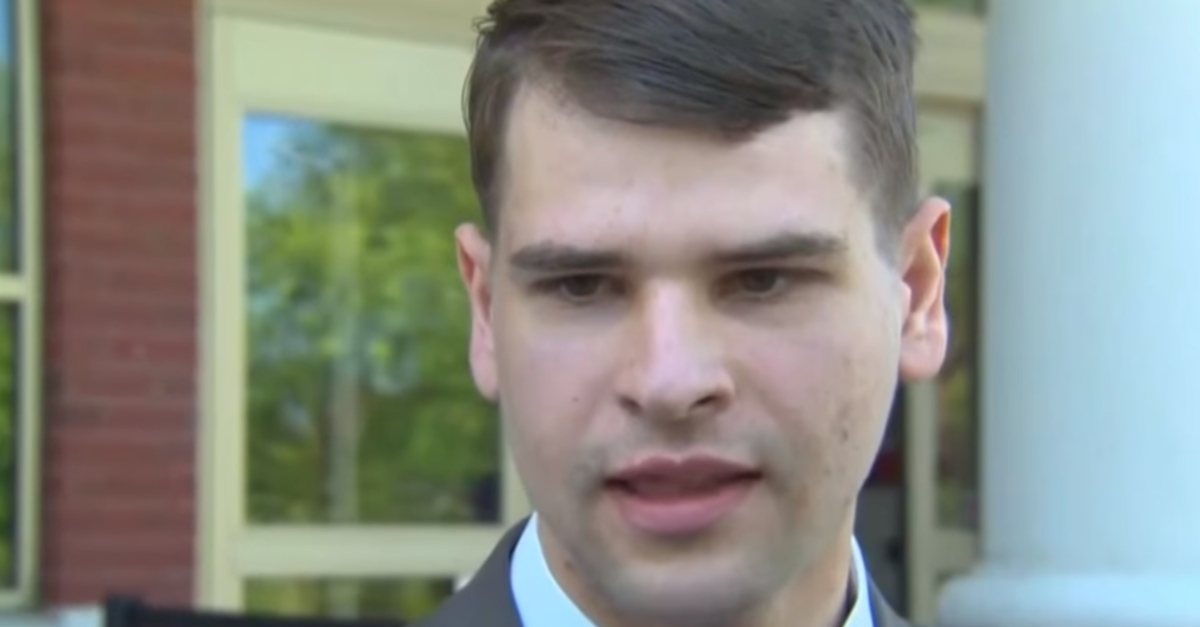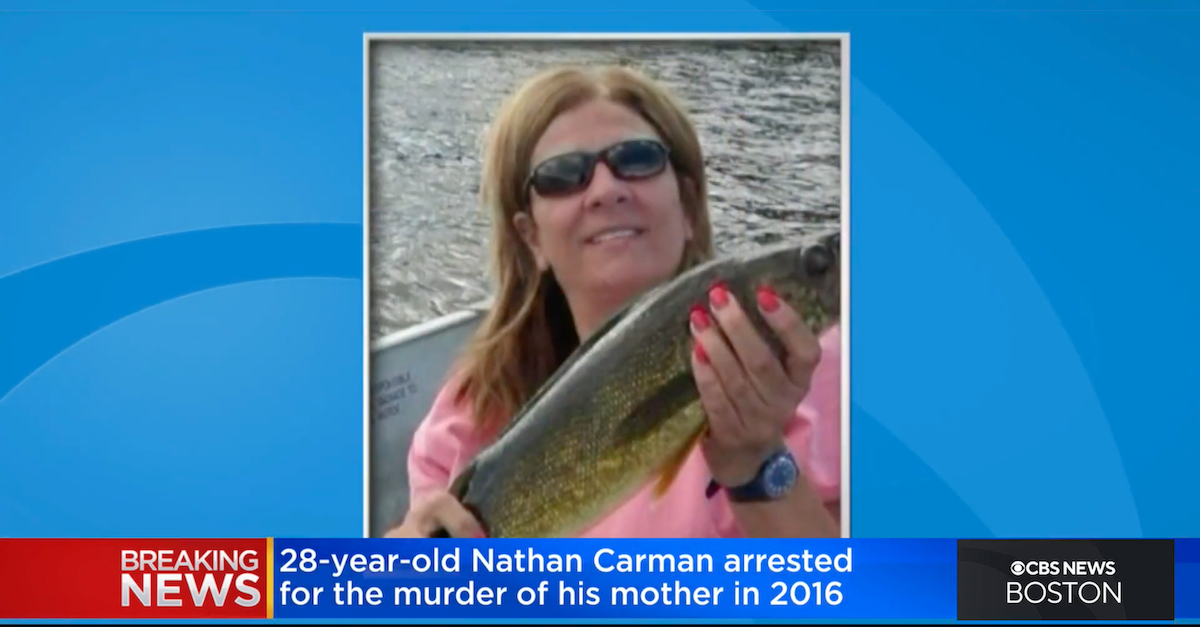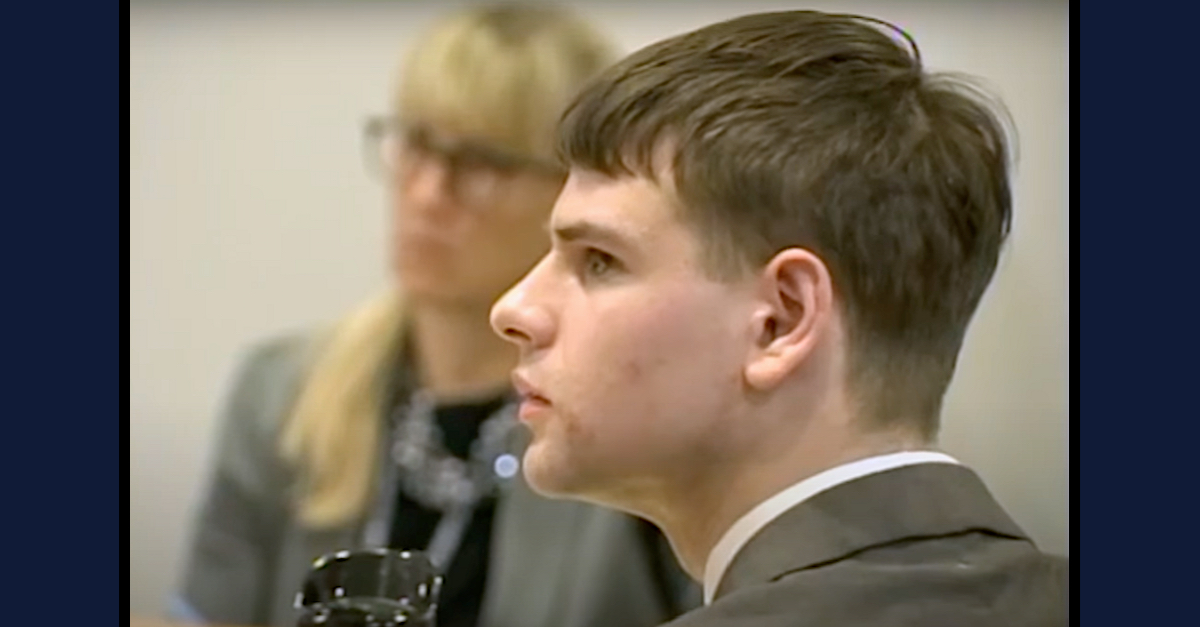
Nathan Carman appears in a WBZ-TV screengrab.
A 28-year-old heir to a New England family fortune has been indicted for allegedly murdering his mother and grandfather, according to federal prosecutors. The criminal indictment adds yet another twist to a years-long legal saga that spanned at least four states in the northeastern United States.
According to federal prosecutors in Vermont, Nathan Carman, 28, of Vernon, Vermont, is charged with eight separate counts, including murder, in connection with the deaths of Linda Carman, his mother, and John Chakalos, his grandfather.
A U.S. Department of Justice press release says the defendant Carman is accused of shooting and killing Chakalos at the latter’s home in Windsor, Connecticut, about an hour and fifteen minutes south of Vernon, in 2013. The defendant Carman is also charged with murdering his mother by sinking a boat “on the high seas” during what was purported to be a fishing trip off the coast of Rhode Island in 2016.
The “high seas” reference is more than simply dramatic — it is a legal term of art which references a specific federal statute involving U.S. territorial jurisdiction.
The motive, prosecutors said, was “to obtain family and insurance funds.”
“The indictment alleges that both killings were part of a scheme to obtain money and property from the estate of John Chakalos and related family trusts,” prosecutors continued. “The indictment further alleges Carman attempted to defraud the company that insured his fishing boat.”

Linda Carman. (Image via WBZ-TV screengrab.)
A nine-page indictment says the defendant and his mother had a “strained” relationship. It recaps the family’s financial affairs as follows:
John Chakalos made tens of millions of dollars by building and renting nursing homes and through other real estate ventures. John Chakalos had four daughters: Elaine Chakalos, Linda Carman, Chai-Jene Gallagher and Valerie Santilli. Chakalos spent time at two residential properties: a house in Windsor, CT, where he maintained his business office, and a house in West Chesterfield, NH, which he had built. As part of his estate planning, John Chakalos created various trusts, including the Chakalos Family Dynasty Trust (Dynasty Trust). The Dynasty Trust was designed to provide distributions to the four daughters and to distribute John’s assets to trusts in the names of the four daughters. Certain additional assets in John Chakalos’s name would pass from his estate into the Dynasty Trust and to the daughters’ trusts after his death. Valerie Santilli was the executor of John Chakalos’s estate. Under the terms of the trusts, the daughters had some control to name the beneficiaries of their trusts. Under the terms of the trusts, the trustees, Larry Santilli and Paul Sterczala, had the power to decide whether to make distributions from the Dynasty Trust and from the daughters’ trusts receiving funds from the Dynasty Trust.
The defendant is said in the indictment to have begun asking “detailed questions” about the family’s financial empire in 2012 and 2013.

Nathan Carman appears in court during a previous civil case in New Hampshire. (Image via screengrab from the Law&Crime Network.)
“By 2013, John Chakalos had set up two bank accounts for which Nathan Carman was the beneficiary upon Chakalos’s death,” the indictment continues. “One account, containing approximately $150,000, was designed to provide financial support for Nathan Carman’s college enrollment. The second account, containing approximately $400,000, listed both Linda Carman and Nathan Carman as beneficiaries on Chakalos’s death.”
Chakalos convinced his daughter, the defendant’s mother, to name the defendant the beneficiary of her own trusts, the indictment says. Chakalos paid for an apartment and a truck for the defendant, but the defendant “failed to complete most of his courses” when he enrolled in a community college, the document indicates.
Meanwhile, according to the feds, the defendant’s mother’s “principal way of interacting” with Nathan was to join him on fishing trips on a vessel named Chicken Pox. Nathan Carman bought the boat in 2015.
According to the indictment, the feds believe the scheme unraveled as follows:
Beginning in or about 2013 and continuing until the present, in the District of Vermont and elsewhere, defendant Nathan Carman devised a scheme to defraud the Estate of John Chakalos, its executor, the Dynasty Trust, and its trustees, and to obtain money from the Dynasty Trust by materially false and fraudulent pretenses, representations, and promises. As a central part of this scheme, Nathan Carman murdered John Chakalos and Linda Carman. He concocted cover stories to conceal his involvement in those killings. As part of his cover-up, Nathan Carman misrepresented his involvement in and responsibility for those deaths to law enforcement, to his family, to others who made inquiries about the deaths and their circumstances, and to others who challenged his cover-up or challenged his rights to his grandfather’s assets.
On November 11, 2013, Nathan Carman used the New Hampshire driver’s license to purchase a Sig Sauer rifle at Shooter’s Outpost in Hookset [sic; it should be spelled Hooksett], NH.
On December 20, 2013, Nathan Carman murdered his grandfather, John Chakalos, shooting him twice with the Sig Sauer while Chakalos slept in his Windsor, CT home.
After Nathan Carman killed John Chakalos, and as part of his plan to cover up his involvement in that crime, Nathan Carman discarded his computer hard drive and the GPS unit that had been in his truck the night of the murder. These acts prevented law enforcement from reviewing the data on these devices.
Prosecutors allege that the defendant lied about his whereabouts, lied about the gun, and lied about his involvement with his grandfather’s murder. When his grandfather died, he inherited $550,000 from multiple accounts, the indictment indicates; however, he blew through the money and became “low on funds” by the end of 2016, prosecutors claim.
So, they allege, he plotted to kill his mother and sink his boat:
In September 2016, Nathan Carman arranged to go on a fishing trip on the Chicken Pox with his mother, Linda Carman. Nathan Carman planned to kill his mother on the trip. He also planned how he would report the sinking of the Chicken Pox and his mother’s disappearance at sea as accidents.
Prior to the trip, Nathan Carman told his mother that they would be fishing in the immediate vicinity of Block Island, RI. Nathan Carman and Linda Carman left in the Chicken Pox from Ram Point Marina in South Kingstown, RI at approximately 11:13 p.m. on September 17, 2016. Linda Carman believed that she would be returning home by noon the next day, as evidenced by the float plan she left with friends.
Prior to the trip, Nathan Carman altered the Chicken Pox in several ways, including removing two forward bulkheads and removing trim tabs from the transom of the hull.
Prior to the trip, Nathan Carman removed his computer from his home, preventing law enforcement from reviewing the computer while he was away.
The defendant killed his mother, the indictment says, and indeed sank the boat; a Coast Guard search began on Sept. 18, 2016, and continued until Sept. 24 of that year. A commercial vessel “rescued” Carman from an “inflatable life raft” on Sept. 25, the feds say, and Carman allegedly lied about everything that had occurred. He asked an insurance company to reimburse him $85,000 for the boat, the indictment indicates.
The bizarre scenario led to several awkward appearances by Carman on morning network television programs.
“Carman even stormed off at one point when questioned about his mother,” Law&Crime noted while observing those appearances back in 2017.
ABC News said Carman had Asperger’s Syndrome during a broadcast which contained several of his interviews.
The indictment notes that the insurance company denied Carman’s claim involving the loss of the boat, but the company went further: it sought a declaratory judgment in Rhode Island to affirm that it made the right call by refusing to pay Carman.
“During the litigation, both in discovery and at trial, Nathan Carman maintained his false narratives, misrepresenting what happened to Linda Carman and what occurred on the Chicken Pox,” it alleges.
By July 2017, the executor of the Chakalos estate sued Nathan Carman in New Hampshire’s probate court system. The civil suit alleged that Nathan Carman was the killer — a move the estate sought to prove in order to block Carman from taking money from his deceased heirs. Carman represented himself during part of the civil proceedings. Some of his self-representation is cued up here:
A judge dismissed the New Hampshire civil case by concluding that Chakalos wasn’t a permanent resident of the Granite State.
Counts one through three of the federal criminal indictment allege that Carman furthered his schemes through the mail. Counts four through six allege that he used email to press his schemes. Count seven alleges that Carman murdered his mother “within the special maritime and territorial jurisdiction of the United States . . . with malice aforethought” and “willfully, deliberately, maliciously, and with premeditation.” Count eight alleges that Carman tried to defraud the insurance company over the loss of the boat.
Carman is due to be arraigned on Wednesday, May 11, before Chief U.S. District Judge Geoffrey W. Crawford in the District of Vermont.
The feds say he could be imprisoned for life if convicted of murder on the high seas; the fraud charges each carry a maximum sentence of up to 30 years behind bars.

Nathan Carman spoke to reporters after a Connecticut memorial service for his mother in 2016. He said his “whole family was invited” and that he was “glad” many chose to attend, but several of his aunts objected to the service. (Image via WTNH-TV screengrab.)
The investigation included the efforts of the Federal Bureau of Investigation, the United States Coast Guard, the Bureau of Alcohol, Tobacco, Firearms, and Explosives, the Connecticut State Police, the Windsor (Connecticut) Police Department, and the South Kingstown (Rhode Island) Police Department.
According to federal court records, Carman is represented by a federal public defender.
Read the indictment and the document which appointed the federal defender below:
[images as noted]
Have a tip we should know? [email protected]